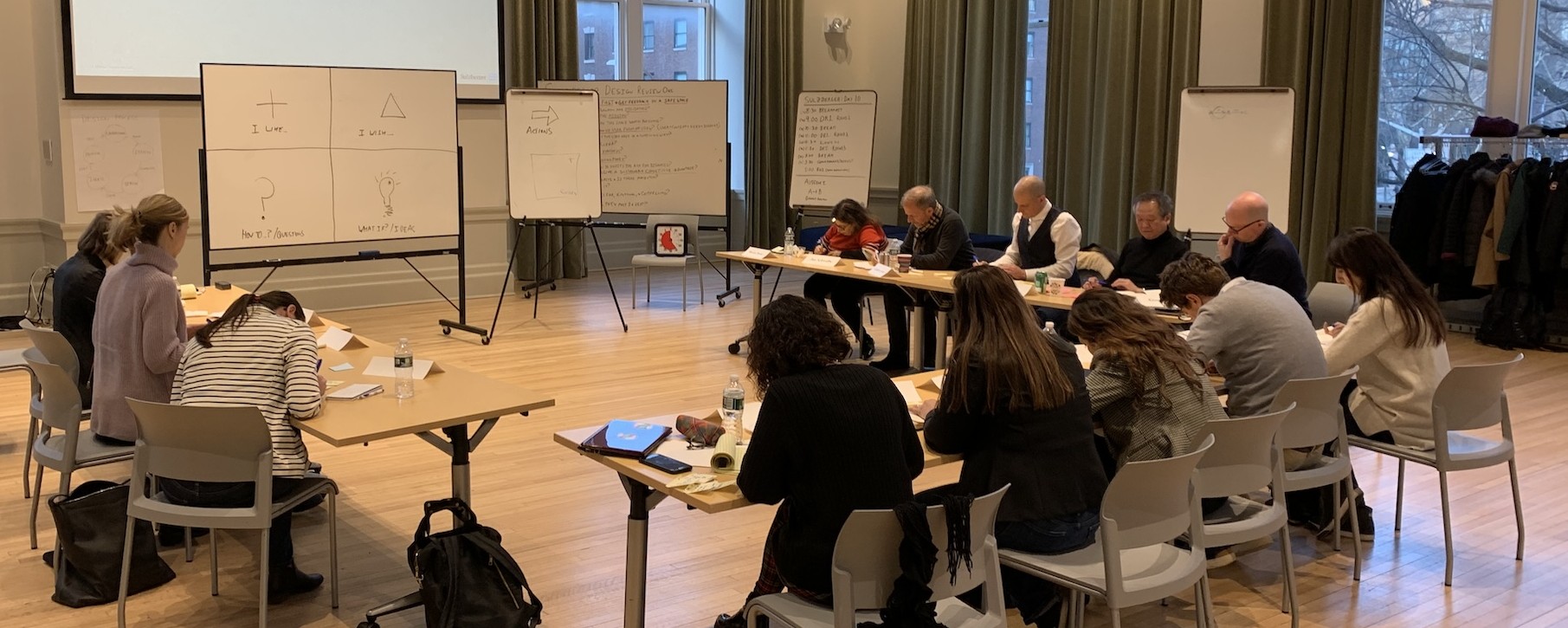
Leadership and Executive Education
Sulzberger Executive Leadership Program
The Sulzberger Executive Leadership Program begins with a two-week intensive at Columbia Journalism School. Fellows then return to their organizations to immediately implement what they learned and are supported through a weekly virtual cohort meeting and one-on-one coaching. The program culminates back at Columbia for a final week-long intensive, including final project presentations.
Interested in joining the program? Sign up to be notified when applications open.
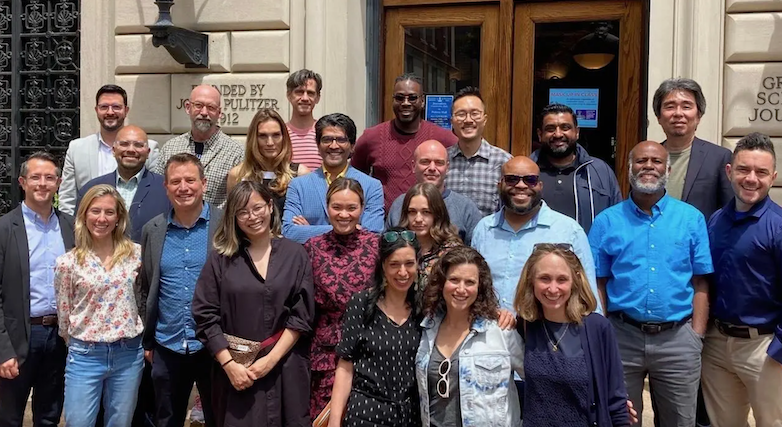
The Program
Fellows in this five-month low-residency program spend three weeks at Columbia Journalism School in New York City, starting with a 10-day residency from Jan 06 - 17, 2025. Fellows then work on their project and assignments back at their organizations and attend a weekly virtual cohort meeting. Fellows return for one final week of residency, May 19-23, 2025.
Note: In-person sessions will adhere to CDC Covid-19 safety guidelines as well as all Covid-19 regulations and protocols required by New York City and Columbia University. Should any of these public health measures prevent in-person instruction, programming will be held virtually.
We focus on:
- Leadership and Building a Culture of Innovation
- Venture Design Innovation Process
- Diversity, Equity, and Inclusion
- Audience and Trends
- Marketing and Strategy
- Negotiations and Pitching
Each fellow is required to bring to the program an individual project of strategic importance to their news organization and of critical importance to their own role.
What Sets the Program Apart
News executives no longer have the luxury of a full year to work on a project. The Sulzberger Program serves as an accelerator for mission-critical projects delivered at a pace that maximizes project success and real-world impact. Participants experience a year's worth of executive education in a focused, concentrated 20-week timeframe.
For executives in journalism navigating an industry facing constant disruption, traditional management training won’t suffice. Media industry leaders need to build cultures and create processes within their media companies that don’t just help them come up with “the next big thing,” but enables the organization to understand and anticipate the changing needs of their audiences, experiment with emerging technologies, and seek sustainable business models as the world rapidly changes beneath their feet. They need to proactively recognize opportunities for innovation and persuade their stakeholders for the resources to pursue them. The Sulzberger Program specifically focuses on building leaders who will thrive under these conditions.
Leaders learn by doing. The Sulzberger Program, redesigned in 2020, maximizes personal growth, retention, and real-world applicability through active, experiential learning. Our unique venture design boot camp is an immersive experience that has fundamentally transformed how executives approach building and leading their organizations. Our project focus means that participants create measurable outcomes throughout the term by working on regular assignments and checking in with faculty, ensuring that what they learn in the classroom translates to their newsroom.
The Sulzberger Program leverages the assets of Columbia University, pulling instructors from the Columbia Journalism and Business Schools, drawing industry innovators working in one of the world’s great media capitals, and tapping into the powerful Columbia Journalism School and Sulzberger alumni networks. This community gives Sulzberger Fellows a broad perspective and powerful network as they take their place leading innovation in media and journalism.
How It Works
The program begins with a five-day immersive project-based Venture Design Bootcamp at our New York City campus. Over the course of the week, fellows form small teams and build a new venture from scratch, learning both the process of building a business as well as the elements that need to come together to make a venture successful. This experiential learning also begins to turn a group of strangers into a cohort built on trust and authenticity that extends well beyond the course.
The program moves from the bootcamp model into workshops, case studies, and guest speaker events that dive deeper into concepts introduced in the first week. Led by Columbia Journalism and Business School faculty, topics include: Leadership, Interpersonal Dynamics, Marketing, Strategy, Negotiations, and Diversity, Equity, & Inclusion. Week Two ends with our first Design Review, where Fellows are able to fail fast and get feedback on their projects from the other members of the cohort.
Fellows return to their newsrooms and begin to apply the lessons learned. The fellows complete two-week sprints, in which they interrogate, test, and apply learnings to their own projects, using the same set of topics that they used in week one. Fellows have a weekly virtual meeting that rotates between getting feedback on their project deliverables and having intimate conversations with industry leaders. Fellows also have one-on-one coaching sessions with the director.
The final week is back in New York City for final project presentations that prepare the fellows to seek support and resources from key stakeholders at their organizations. Fellows also visit with senior leaders at various NYC-based journalism institutions to see how the concepts they have learned throughout the course are applied in C-level roles.
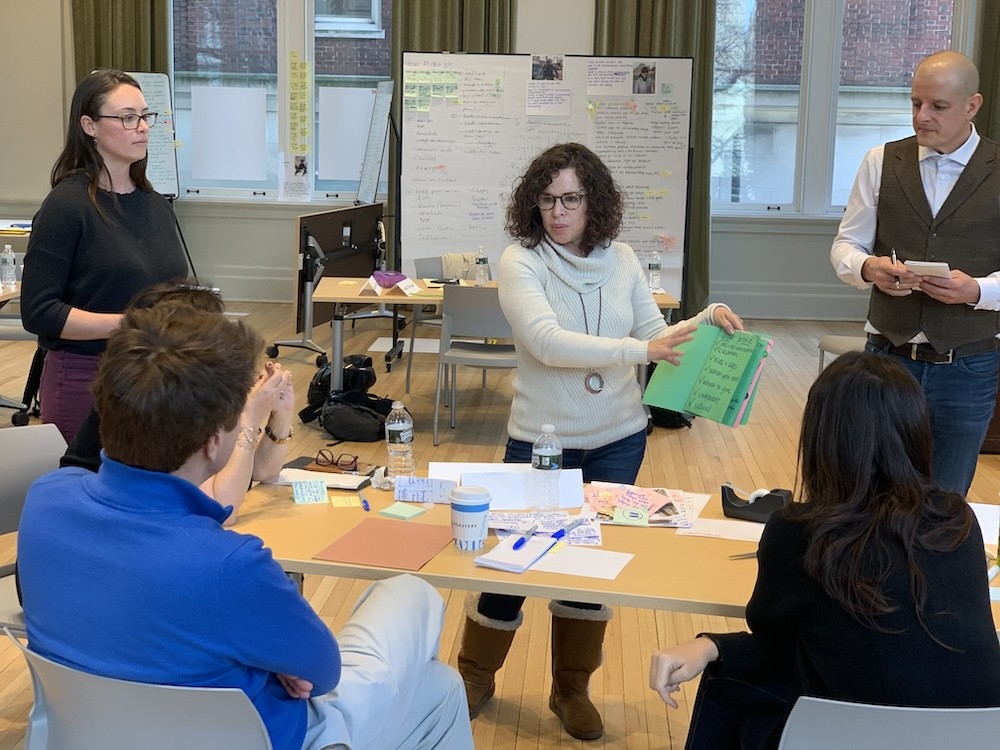
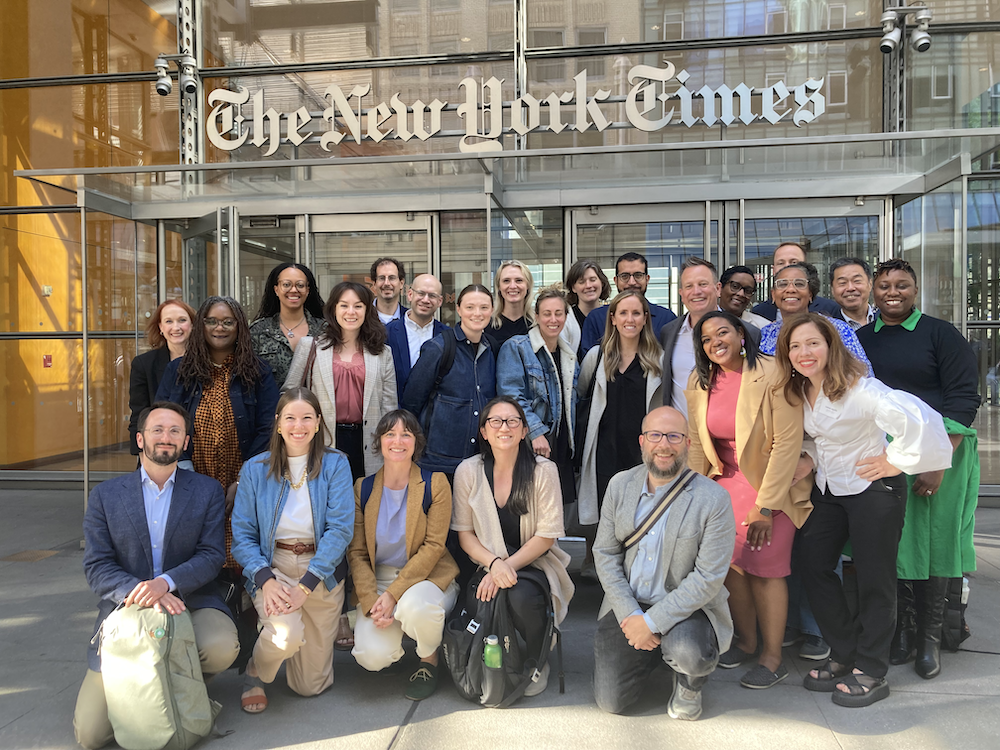
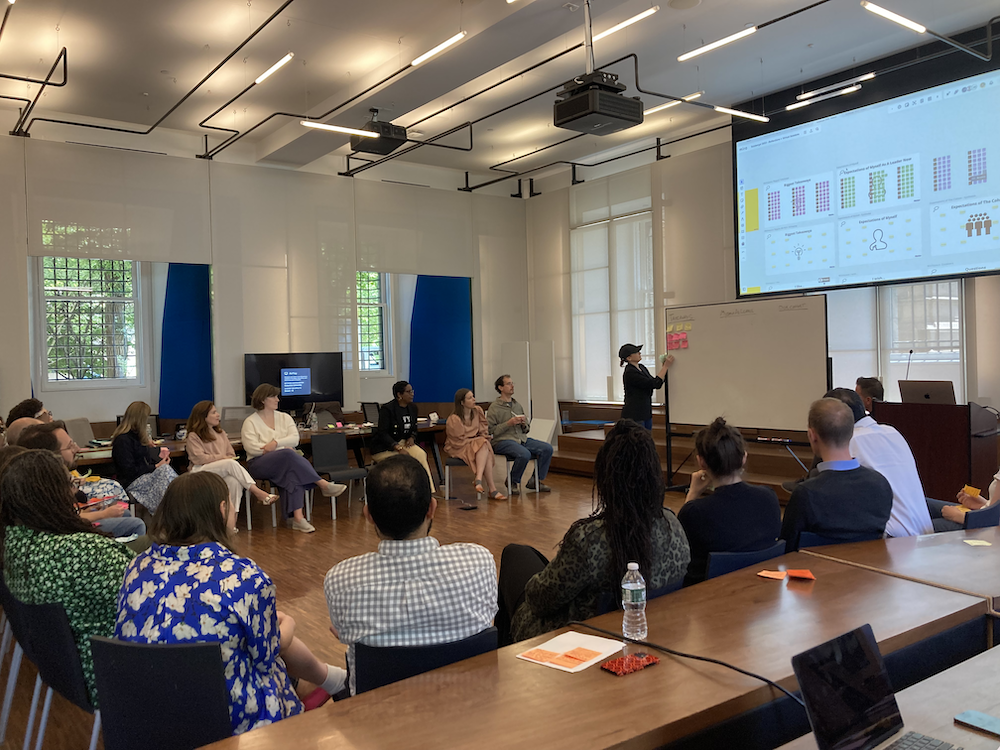
Who and How
The Program is designed for senior and rising newsroom and business-of-news practitioners. Our fellows come from a wide variety of news organizations, from the U.S. and internationally. We encourage organizations interested in fostering multidisciplinary collaboration to consider sending a team. We strongly encourage nominations of rising leaders from groups typically underrepresented in journalism.
Corey Ford, director
Corey Ford joined Columbia in 2019 to redesign, run, and teach The Sulzberger Executive Leadership Program based on his extensive experience coaching and teaching media entrepreneurs and executives through his company, Matter Ventures.
From 2012 to 2019, Matter was a startup accelerator based in San Francisco and New York City and a venture capital firm grounded in the principles of design thinking that supported early-stage media entrepreneurs and mission-aligned media institutions. Prior to Matter, Corey built Runway, a pre-team, pre-idea incubator at Eric Schmidt’s Innovation Endeavors. He also taught design thinking innovation at the Stanford d.school. Ford began his career in journalism managing the production of 17 films for the PBS/WGBH series FRONTLINE for films that won an Emmy and a duPont-Columbia Gold Baton Award. He earned an MBA at Stanford, was a Kauffman Fellow and was a Morehead Scholar at UNC-Chapel Hill.
Tuition is $20,000 for the complete program. Fees include course training, daily breakfast and lunches, and a few group dinners during the residency weeks. All other expenses, including travel and lodging, are the responsibility of participants and/or their sponsoring organizations. Participants can take advantage of Columbia discounts at area hotels.
The Sulzberger Fellowship is open to any leader in journalism and media from anywhere in the world to apply to directly. Most fellows are sponsored directly by their employer or by a donor to their employer. Available scholarships are listed below, and new scholarships may become available throughout the application period. Individuals without a sponsoring organization or relevant scholarship may also choose to apply directly and self-fund. We encourage all interested individuals to apply directly to the program regardless of their current sponsorship status.
Below are available scholarships that individual applicants can apply to directly. To apply to any scholarships, applicants should fill out the standard application by the standard timeline listed below, check the box for the scholarships they are interested in, and complete the supplemental questions about their eligibility for the scholarship(s).
The deadline for all scholarships is Oct. 15, 2023.
Note: This list will be updated as we add new scholarships. Applicants who have already completed an application will be notified of any new scholarships as they become available. If you would like to provide a scholarship, please reach out directly to the Program Director.
Google News Initiative (Underrepresented Leaders, Global)
Google News Initiative is sponsoring four scholarships for leaders from groups typically underrepresented in journalism to attend the 2022 Sulzberger Executive Leadership Program at Columbia Journalism School. Any leader in journalism across the world who self-identifies as being from a group typically underrepresented in journalism is eligible to apply. This scholarship covers tuition as well as travel costs to New York City for the residency weeks.
Applications will open on Thursday, May 30, 2024. The final deadline is Sunday, October 13, 2024. The cohort will be announced no later than Thursday, November 14, 2024.
The application is a simple form that consists of 4 sections:
- Basic information
- Demographic information
- Application questions
- Financial considerations
Before you begin the form, you will want to prepare paragraph-length answers in English to the following 5 questions:
- Describe your current role and responsibilities in your organization. (For context, please include who you lead and who you report to.)
- a) Paste a link to a project or work sample that you are proud to have significantly contributed to:
b) Tell us more about the link you just provided. Why are you proud of it? What was your role? - Why do you want to be a Sulzberger Fellow?
- Describe your proposed Sulzberger Project. (What problem are you trying to solve and why? What team, resources, and internal support for this project do you currently have? How much time can you spend on this project as part of your current job?)
- If your first choice of project were not to work out, what would you choose as an alternative project?
Once your application is reviewed, promising applicants will be selected for a virtual interview with Director Corey Ford.
For international applicants, please see this privacy notice: https://www.cuit.columbia.edu/privacy-notice.
Want to learn more? Sign up for an Info Session.
- Sulzberger 2025 Info Session #1: Tuesday, June 25, 2024 Noon - 01:00 PM ET
- Sulzberger 2025 Info Session #2: Tuesday, July 23, 2024 Noon - 01:00 PM ET
- Sulzberger 2025 Info Session #3: Tuesday, August 20, 2024 Noon - 01:00 PM ET
- Sulzberger 2025 Info Session #4: Tuesday, September 17, 2024 Noon - 01:00 PM ET
FAQs
For international applicants, please see privacy notice: https://www.cuit.columbia.edu/privacy-notice
Classes at Columbia are held in January (ten class days) and May (five class days) for the 2025 cohort. The dates are Jan 06 - 17, 2025 and May 19-23, 2025.
If, as we near the start of the program, conditions appear to be unsafe due to COVID-19, we will switch to online learning until it is safe to gather in person again.
We understand that the topics that this course takes on — revenue models, product development, resource allocation, teams building — speak directly to news organizations’ most serious concerns, and we respect a desire to keep this private. We have found that one of the most fruitful and rewarding elements of the program is what Fellows learn from their peers, and so we have a strict norm of respect, discretion, and confidentiality within the cohort.
Don't worry about getting the project exactly right as part of your application. The iterative and feedback-driven nature of the program means that your project will evolve through the course of the program. The rapidly changing nature of the industry and the world means you may need to shift strategic focus along the way. That's what innovative leaders do. Do your best to come up with a primary project focus and a back-up project focus and articulate those in your application. As part of the interview process, you will talk through your project with the Program Director and get feedback on how to adjust it for the program. All projects should be strategically important to your organization and should be part of your day-to-day work during the course of your program. We are not interested in doing projects as an academic exercise.
Yes. If you are interested in the program, you should apply directly, regardless of whether your company is currently sponsoring a fellow. If your application looks promising, we may be able to work with you to discuss this opportunity with your employer. We may also have additional scholarship opportunities that present themselves. Just make clear in your application whether you already have a financial sponsor and, if you are not able to obtain one, whether you are able to self-fund.
All Fellows will have significant time with the Program Director. The Program Director will be teaching and/or facilitating every experience in the course and giving detailed feedback on each fellow's project. During the 18 weeks between program sessions, the Program Director will facilitate and/or teach each weekly virtual session. The Program Director will also hold one-on-one coaching sessions with each Fellow.
All fellows are required to participate in the three intensive in-person weeks without exception. During the 17 weeks of weekly virtual classes, we expect that Fellows may miss one or two sessions due to vacations. Fellows should proactively communicate any potential scheduling conflicts in advance.
There is no housing associated with the course. Columbia University has relationships with many area hotels, many of which offer a preferential rate to those studying at the Journalism School. You can download a list of some of these options. This list is not an endorsement.
If you have dietary restrictions or sensitivities, please notify Director of Professional Programs, Kate Kennedy, regarding their nature before the program start date.
This is a non-degree program. You will receive a statement of attendance upon completion of the program.
In 2005, the sisters of the legendary New York Times publisher Arthur Ochs (“Punch”) Sulzberger honored their brother by investing in a program they hoped would encourage innovation and sustainability in the news business. In collaboration with Columbia Journalism School, they envisioned a program that would focus on solutions and would provide the leaders of the industry with the tools they need for sustained success. The Sulzberger Program launched its first class of Fellows in 2007.
Please contact Kate Kennedy, director of Professional Programs.